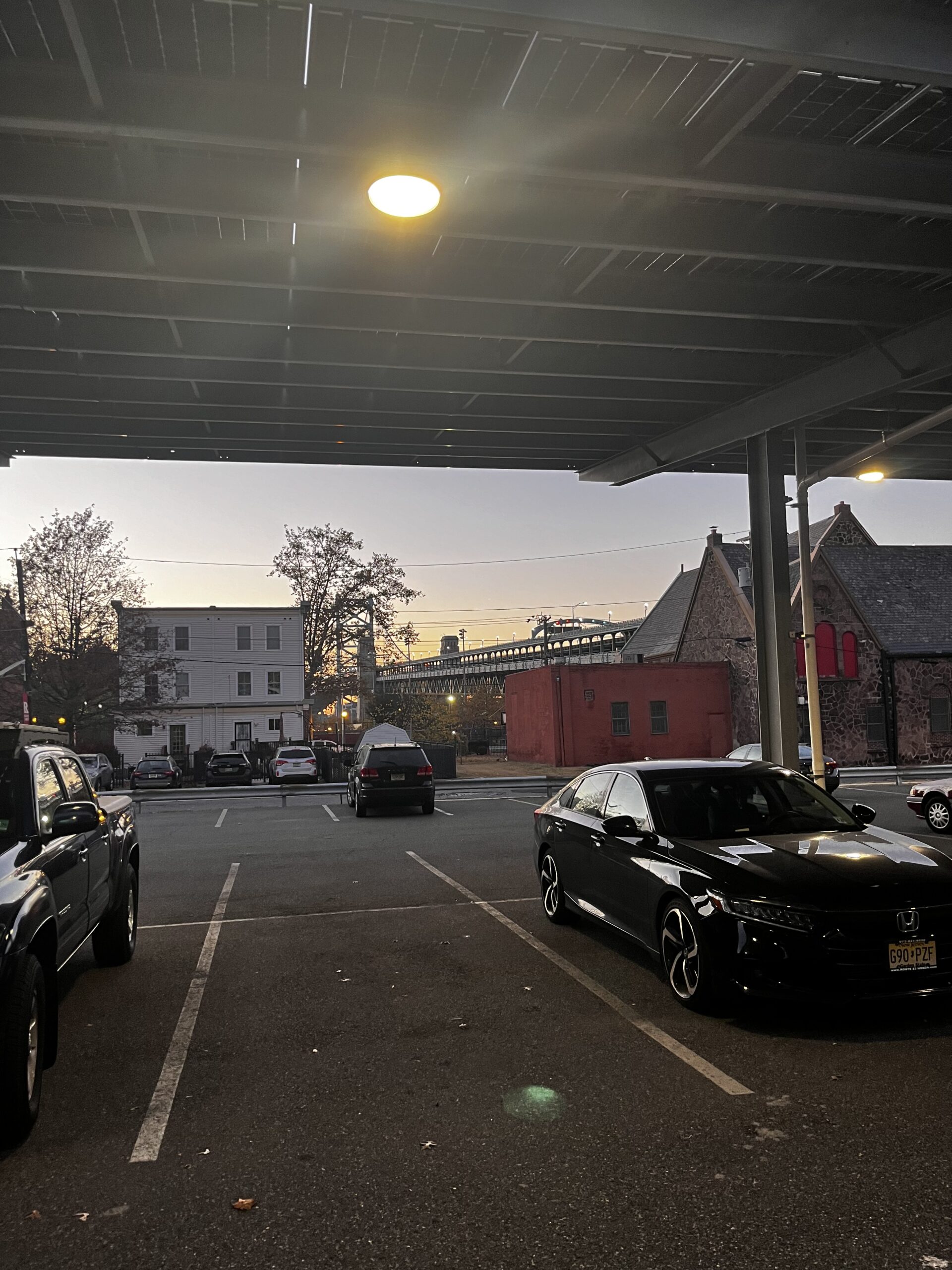
Which is Really Worth It: Campus Parking or Parking Meters?
Campus parking has become a point of contention for the Rutgers–Camden community over the past few months. Aside from the regular complaints from students regarding quality and convenience compared to price, security has also become a major concern following multiple robberies out of the Rutgers Camden commuter parking lots during the 2024 Spring semester. Since then, the Rutgers’ Division of Institutional Planning and Operations (IP&O) has begun measures to improve the campus parking across the entire university. But what do students want to see happen, and what is the IP&O’s plan?
To overview the current parking plan, each semester, Rutgers offers parking passes for commuter and on campus students to be able to bring their cars to campus. There are multiple different types of passes for Camden students; a commuter pass, a commuter night pass, a resident pass, and a daily pass. These passes also all have differing prices, with the regular commuter pass totaling $150, the night commuter totaling $50, and the resident totaling $212. To pay for the passes, a student can add them to their term bill, or they can pay for them with a credit card. They are not able to use their financial aid towards the parking permit. Students are also able to add as many vehicles to their pass as needed with no additional fee, though if there is more than one of those cars in the lots at once, the student will receive a citation. Multiple disability services are also offered, such as access to the disabled spots, which is free with an approved disability placard and ADA registration form, as well as an option for additional parking, which can be received through the DOTS Additional Parking Request form and allows the student to park in lots closer to their class for a $30 fee per semester.
But with the costs of a parking pass reaching from $50 to $212, what exactly are students paying for? Regular commuters can park in the commuter lots (lots C15 or C16) on weekdays and faculty lots (lots C1, C2, C3, or C14) on weekends all day or weekdays from 3:30 PM to 2 AM. Night commuters are able to park in commuter lots or faculty lots but only between 3:30 PM and 2 AM with the commuter lots closing at 9 PM and have full access to the faculty lots on weekends. Residents can only park in resident lots (Lots C10, C12, and C13) but face no time restrictions. Security and quality also come into factor when looking at the parking prices. The campus lots are patrolled by security officers, and students are able to request RUPD escorts to walk with them to the parking lots, but this isn’t exclusive to parking pass owners. Any student can request a RUPD escort to take them to any part of campus, including the train stations and campus housing. Regarding the quality of the lots, the commuter lots are surrounded by wire fencing, with C15 being fully paved and C16 being fully gravel. During the Fall and Spring semesters of the 2023-24 year, Lot C15 was closed and replaced with the lot next to C16 on Delaware Ave, another paved lot that was not exclusive to RUC students and was shared with buses bringing school trips to Camden. The resident lots are mainly paved, with the exception of lot C1o which is half paved and half gravel. Another important aspect of the parking passes is convenience, especially for commuters who choose between campus parking permits, metered parking across the city, or public transportation. The commuter lots are about a ten-minute walk from the Fine Arts Building, which is the closest campus building to the lots in which classes are held. The shuttle can also take students from the commuter lots to the Law Building in about three minutes. It stops at both lots in increments of ten minutes for the majority of the day from Monday through Thursday and increments of twenty minutes on Fridays. The shuttle is able to be tracked through the Rutgers Camden app or the MyRutgers app giving a minute estimate of how far away each shuttle is from any stop.
But is all of this worth it for $150? Criminal Justice student Yasly Nunez doesn’t seem to think it is, “For the money we pay for our parking spots, the past incidents of at least two Kias getting stolen should have never have happened. It puts students’ safety at risk and wastes our time, resources, and funding. Security should be doing their best to prevent this and protect us.” Nunez is referring to when a car was stolen out of the commuter lot during the 2024 Spring Semester on March 26th. The email sent out through the Rutgers Crime Alerts read, “The Rutgers University Police Department is investigating an automobile theft which occurred on March 26, 2024 between the hours of 1:45 PM and 3:45 PM while parked in Rutgers Parking Lot #C16. In this incident, the victim, who is affiliated with Rutgers University, reported that their vehicle, a white 2018 Kia Sportage, was parked in the lot at approximately 1:45 PM and was discovered missing upon their return to the area at approximately 3:45 PM.” RUPD responded to the theft on April 10th with another email, recommending that Rutgers–Camden community members purchase steering wheel locks and began offering complimentary ones to owners of Kias and Hyundais. The email said, “Additionally, Rutgers-affiliated Hyundai and Kia owners can obtain a complimentary steering wheel lock by visiting Rutgers University Campus Center, Community Policing Office.”
Nunez also commented on the pricing of the parking permits, “The fact we pay $200 on top of tuition is ridiculous and another financial burden for many. Many low-income students commute and face enough hardships as it is.” Another student, Nursing Major Vincent Crocilla, stated, “The parking spots should be closer to the school. I don’t understand why on-campus students’ parking spots are closer to the school when the majority of Rutgers students are commuters. On-campus students already have an advantage by being in close proximity to the school where commuters have to either walk or wait for the unreliable shuttle, which fills up easily.” Nunez then continued with the shuttle topic, adding, “For three of them just to go around every half hour is very inconvenient and makes many students late to the lectures they pay for.” Crocilla then continued, “And the shuttle drivers always make me sick. I keep getting carsick from the shuttles, I’m flying out of my seat, and it ruins my day.” Nunez joked, “I’m bumping all around like I’m at Six Flags!”
Nursing student Adriel Rebancos shared his opinions on the faculty lots, “I think it would be fair if they made both students and faculty park in the same lots instead of having designated spots for staff and faculty. ‘Cause it’s not fair that they make the students commute from the lots to the campus while the professors park right next to campus. I guess it comes with the job, but then again, why do students have to go through all this trouble when we could all just park in the same lots.” But, the faculty also have to pay for their parking at much higher prices than students. Their parking has three tiers, the cheapest being a general pass allowing them to park in any lots, the second being a guaranteed pass which allows them to park in any lots as well as the guaranteed reserved spots and the most expensive being a reserved pass which reserves them a specific spot in a lot. Their passes are paid for annually in conjunction with their 12-month teaching contracts. The general passes cost 0.05% of their annual salary, getting capped at $600, the guaranteed passes cost $800, and the reserved spots cost $1,600.
Many students and faculty decide to opt out of the campus parking permits. You can pay for the metered parking as an alternative through the city. The meters are located closer to campus than the commuter lots with street parking along Pearl Street, Friends Street, and N Third Street, which all sit along the west side of the campus or parking along N Fifth Street and Penn St, which run alongside Armitage Hall and the Law School. The metered parking is also available on the surrounding streets of the Nursing and Science building and the Biology building.
As for pricing, the parking meters are able to be paid for on the PayByPhone app or the physical meters and are priced by hour. The cheapest option for one hour of parking is $1.60, with each hour increasing by $1.25. If a student were planning on using the meters to attend one regular hour and a half class they would need to pay for the full 2 hours costing $2.85, adding up to $5.70 a week and about $79.80 per semester, assuming there were no canceled or skipped classes. To try and understand the price of a full-time, in-person student using the meters to park here is a thought experiment. In this case, the student is taking all five classes in person and does not stay any additional time outside of their classes–this would be impossible considering the nature of the class schedule, but this gives us a relatively low estimate of how much the meters can cost per semester. If this hypothetical student has only one-and-a-half-hour classes that meet two times a week, they would be on campus for 15 hours a week, amounting to $19.10 in parking per week. Assuming they do not miss any classes nor do any of their classes get canceled they would attend class for about fourteen weeks in the fall semester. This would total $267.40 in parking per semester, about $100 more than the campus parking permits. Though this is not an entirely realistic experiment, with most students taking an online class and skipping a few classes here and there and staying on campus longer than just the allotted class periods for breaks, meetings, extra-curricular activities, etc. So, this $267 price isn’t too far off for most full-time students.
Camryn Champion is a full time English student who uses the parking meters as well as public transportation to get to campus. Champion explains how “I think all parking on and around campus should be free for all students and staff… finding somewhere to park shouldn’t be something we have to worry about when we are already paying thousands of dollars a year… I’ll probably never use the commuter lots because the price is insane with all the other things we already have to pay for just to go to school. It’s also so out of the way of campus for all that money you’re paying you have to make sure you have enough time not just for the drive but also your walk to class, and the shuttles are supposed to make that easier, but they are barely helpful unless you happen to catch one.” She also discussed her experience with the public transportation on campus, “The train is most of the time pretty convenient if it is running on schedule. The only downside is the train frequently runs late making you late for class.”
So, if students who actually use the parking passes are just as upset about the campus parking as the students who have started using the meters, how is the school planning to fix this? Rutgers has been trying to change the parking permits throughout the semester. In October and November of 2024 Rutgers IP&O held multiple focus groups across all three campuses to get student opinions on the current parking plan. In a DOTS email from October 17th of 2024, IP&O stated they “…hired the consulting firm Brailsford & Dunlavey to conduct a comprehensive review of every aspect of our parking and transportation operations, including potential technological improvements. Your participation in this process is critical, as your input can inform future enhancements to the system and improve the campus community experience.” The focus groups were held in-person and on Zoom in all three campuses, though when reaching out to IP&O, they stated that the focus groups were not recorded for students to watch if they were unable to make it to the events. Evidently, the school does seem to be making strides towards change for the campus parking but Rutgers community members will have to wait over the upcoming months to see what’s truly to come.

